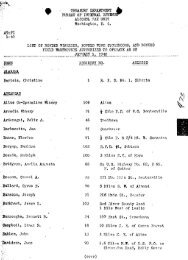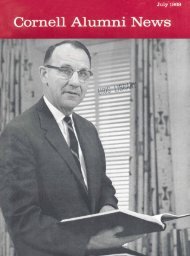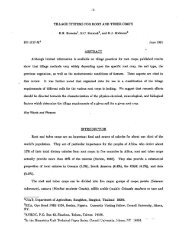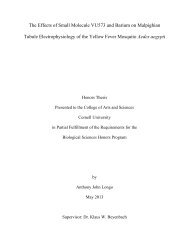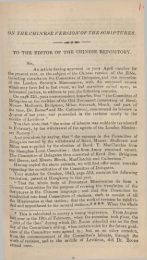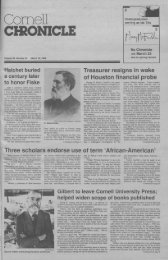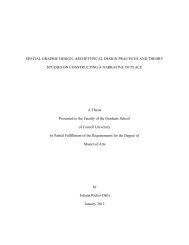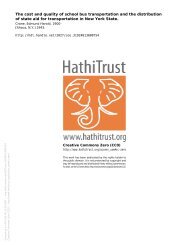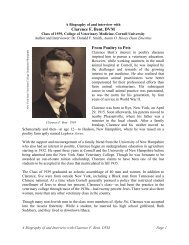archaeological and textual records - eCommons@Cornell - Cornell ...
archaeological and textual records - eCommons@Cornell - Cornell ...
archaeological and textual records - eCommons@Cornell - Cornell ...
Create successful ePaper yourself
Turn your PDF publications into a flip-book with our unique Google optimized e-Paper software.
ecalled how a party of Iroquois h<strong>and</strong>-delivered a letter from Garnier to him. Xavier<br />
asked the party how Garnier <strong>and</strong> his charges were doing <strong>and</strong> was given some vexing<br />
news. He wrote:<br />
The 11th. They summoned me to the council, where the ambassadors who<br />
came From the Iroquois h<strong>and</strong>ed me Reverend Father Garnier’s Letters. When I<br />
had read Them, they asked me whether matters were right. I replied that they<br />
were, provided The Iroquois kept their word; that there was, however, one<br />
thing wrong, <strong>and</strong> this was that they had talked too much while with the<br />
Iroquois, — that they had said that they had driven the black gown away from<br />
their country, <strong>and</strong> would no longer have any Relations with the French. They<br />
were so surprised at such a deception that they remained for a long time<br />
without uttering a word. Finally they cried out: “It is the Iroquois who have<br />
invented that; they love not the French. But we love the black gown. We beg<br />
thee to continue to take care of us, to instruct our children, <strong>and</strong> to love us.” (JR<br />
58:51-53)<br />
This passage dates to sometime around June 1673 <strong>and</strong> is yet another example<br />
of how the missions were often at the mercy of politics. The identities of the Iroquoian<br />
messengers are not clear from the text, <strong>and</strong> so the correlation of this passage to a<br />
historical event remains, for now, uncertain. However, later on in the volume, Father<br />
Raffeix <strong>and</strong> Garnier write in detail of the missions at St. Michael, La Conception <strong>and</strong><br />
St. Jacques, <strong>and</strong> no mention of expulsion is made.<br />
Of his charges at St. Michael <strong>and</strong> St. Jacques, Father Garnier seems to have felt<br />
that indigenous “superstition” was the last remaining obstacle to Catholicism:<br />
[if they] had detached themselves from the superstitions of the country as<br />
thoroughly as they have hitherto preserved themselves from the vice of<br />
drunkenness, we would have no trouble in making true Christians of them. Most of<br />
them ask Father Garnier for baptism, <strong>and</strong> he is obliged to refuse them, because<br />
they will not renounce some dances <strong>and</strong> other superstitious ceremonies which they<br />
use as remedies in their illnesses. Two things render follies of this kind more<br />
difficult to cast off: the first is the false hope of recovering health by this means;<br />
the second is the profit that many of them derive from it. This has not prevented<br />
two of the poorest families of the village from giving an example of generosity <strong>and</strong><br />
fidelity to God, — all the more admirable since, in ab<strong>and</strong>oning the practice of<br />
32



